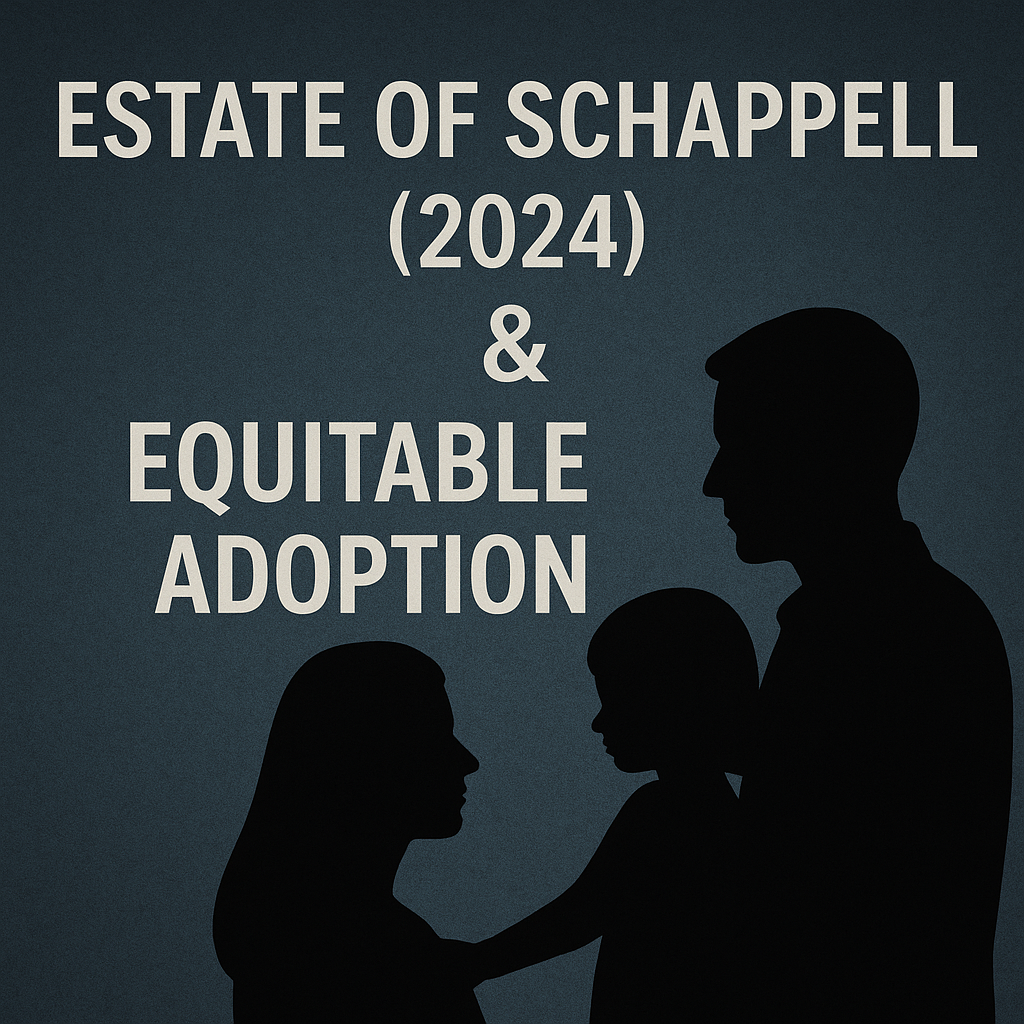For purposes of inheritance, children fall into two categories: natural or biological children, and adoptive children. In this context, “adoptive children” refers to those children who have been formally adopted in accordance with the statutory requirements of the State of Maryland. The adoption process in Maryland is a multi-step process and is fairly involved. If a person passes away without a will, Maryland’s intestacy laws will apply, which means that assets are distributed according to fixed rules of succession. Ordinarily, stepchildren are not a part of this intestate hierarchy of succession, which means that many stepchildren stand to inherit zero if their stepparent passes away without a will.
What happens when a person passes away intestate but treated his or her stepchild as his or her natural child, and intended for the stepchild to inherit as a natural child? In these situations, the doctrine of “equitable adoption” may come into play.
The case of Estate of Schappell (2024) is a recent case which involved the concept of equitable adoption. This case is complex, and so this article will confine itself to discussing some of the core principles involved with the doctrine of equitable adoption.
Factual Posture of the Case
The decedent in this case had no natural children and very few living relatives. In addition, his wife (the claimant’s biological mother) predeceased him, and he passed away intestate. Hence, when he passed, the state was prepared to handle the decedent’s estate according to the predeveloped intestacy rules, but the decedent’s stepdaughter argued that she should be considered “equitably adopted” for purposes of inheritance.
The stepdaughter stated that, during the decedent’s lifetime, the decedent considered his stepchild to be his full child, and often made remarks and representations which gave this impression. He routinely referred to her as “his daughter,” and referred to his stepdaughter’s husband as his son-in-law. Apparently, the decedent also told his stepdaughter that he intended for her to inherit his estate following his death; he communicated this intent on multiple occasions.
When the decedent’s estate was preparing to be settled, the stepdaughter filed a petition to have her recognized as an heir via equitable adoption. She argued that, although the decedent never formally adopted her, and apparently had no intention of formally adopting her, the decedent’s conduct showed an intent to treat her as his natural child, and that this conduct fulfills the principles of equitable adoption in Maryland. The decedent’s surviving relatives attempted to block this petition, and argued that equitable adoption should not apply in this case.
Ruling & Post-Ruling Discussion
Procedurally, this case is a bit complicated, and currently there has not been a resolution to the issue as to whether the stepdaughter should be classified as an adoptive child for purposes of inheritance. But, a Maryland Appellate Court gave a good, lengthy discussion on the current status of equitable adoption in its most recent treatment of this case.
At this time, different jurisdictions treat equitable adoption quite differently; if we look at the law of other states, such as West Virginia, we can see that there is no consensus regarding many of the core points. Certain jurisdictions have almost barred recognition of this concept entirely, and uphold a near bright line rule with respect to adoption. West Virginia has become famous for its more liberal construction of equitable adoption, as it has held that equitably adopted children are essentially interchangeable with statutorily adopted children for all purposes, but just inheritance.
On a scale, Maryland is relatively close to West Virginia, but not exactly on par. Here, courts will conduct a fact sensitive analysis which focuses on the overall fairness of considering a given person as the equitably adoptive child of a given parent. Basically, the court will take into account all relevant facts and circumstances, and determine whether equitable adoption should be granted in order to avoid an unfair result. The key focus is whether there was a genuine parental-child bond between the two individuals, not whether the putative child detrimentally relied on statements given by the parent, or any other considerations.
Contact the Murphy Law Firm for More Information
If readers want to learn more about equitable adoption in Maryland law, filing a determination of heir, drafting an enforceable will, or any other relevant estate planning matter, contact one of the estate planning attorneys at the Murphy Law Firm today by calling 240-219-1187.







.webp)











